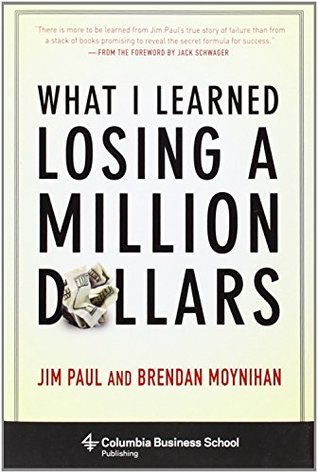More on this book
Community
Kindle Notes & Highlights
Success can be built upon repeated failures when the failures aren’t taken personally; likewise, failure can be built upon repeated successes when the successes are taken personally.
People lose money in the markets either because of errors in their analysis or because of psychological factors that prevent the application of the analysis. Most of the losses are due to the latter.
People fail for the most part because they shoot themselves in the foot. If you go for a long time without shooting yourself in the foot, other people start calling you a genius.
Emotions per se cannot be avoided. Emotionalism, on the other hand, can and should be avoided. Emotionalism is decision making based on emotions.
In the markets, people tend to have difficulty actively (as opposed to passively, as in the case of the fruit dealer and bulb manufacturer) taking losses (i.e., accepting and controlling losses so that the business venture itself doesn’t become a loser).
Losses from continuous processes are much more prone to become internalized because, like all internal losses, there is no predetermined ending point.
The word speculation is derived from the Latin word specere, which means “to see.” Speculating means vision, perception, the faculty of intellectual examination.
When the sentiments and ideas of all the people in the gathering take one and the same direction and their conscious individual personality disappears, then the gathering has become a psychological crowd.3 It is my contention that this process does not require a gathering of people; an isolated individual who displays those characteristics is, for all intents and purposes, a member of the crowd.
That uncertainty about the future also elicits two primary emotional responses: hope and fear. We hope the future will turn out well, but we fear it won’t.
If you don’t have some means of stopping the continuous process, nothing is locked in—profit or loss—and you’re leaving yourself open to being pushed and pulled around by fluctuating prices, random news events, and other people’s opinions.
Trying to be right (i.e., betting) about an event that never ends means that you will never be completely right.
Under pressure in the time of crisis, emotions determine their decisions and actions. On the other hand, a plan establishes objective criteria and forces you to distinguish between decision making based on thinking and decision making based on emotions (i.e., emotionalism).
The formula for failure is not lack of knowledge, brains, skill, or hard work, and it’s not lack of luck; it’s personalizing losses, especially if preceded by a string of wins or profits. It’s refusing to acknowledge and accept the reality of a loss when it starts to occur because to do so would reflect negatively on you.


